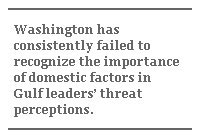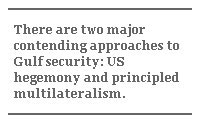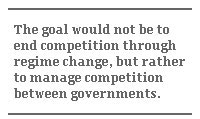Gulf Security in a Globalizing World: Going beyond US Hegemony
Gulf Security in a Globalizing World: Going beyond US Hegemony

MUSCATINE, IOWA: Despite its political instabilities, the Persian Gulf continues to be the home of the most easily exploited and cost-effective petroleum reserves in the world – natural resources that are undergirding the phenomenal economic rise of India and China and the world’s continuous prosperity. Not surprisingly, analysts the world over view the Gulf as the most strategically important region for the indefinite future. As the US hands over sovereignty to Iraq in the middle of violence and insecurity, it must make a key strategic choice for securing peace in the Middle East. The US can either attempt again to impose an American hegemony through bilateral arrangements with its 'friends', or it can push forward with a multilateral approach that would include all governments in the region.
The US invasion and occupation of Iraq has cemented a strategic reality that has been evolving for three decades: the rise of the United States as an external guarantor of Gulf security. US military bases, ports of call, troop deployments, and extensive sharing of high-tech weapons technology now define the Gulf environment. By design or by accident, so-called “rogue states” (Syria and Iran) are completely surrounded by US deployments in and around the region.

However, although US military dominance may be unquestioned, the downward spiral of the US occupation in Iraq and increased terror attacks and domestic instabilities in Saudi Arabia have created an unprecedented legitimacy crisis within the region, raising fundamental questions about the future of Gulf security. With the abuses of Abu Ghraib imprinted on the collective psyche of Gulf societies for at least a generation, how should external powers move forward in their policies toward the Gulf?
In the past, the United States focused almost completely on building up strong local allies, or “pillars,” to dominate the region without taking account of the domestic side of security. In the 1970s, the United States relied on a strategy of “local hegemony” – support for Saudi Arabia and the Shah of Iran as the principle rule-makers of the Gulf region. However, this strategy failed when the Iranian coup of 1979 ejected the Shah from power, and later when the rise of transnational terror groups with Saudi citizens as active members resulted in the terrorist attacks of September 11, 2001.
In the 1980s, the United States tried to secure peace by creating a pure “balance of power”, which included US intelligence and financial aid to Iraq in its war with Iran. This approach kept both countries from growing too powerful and thereby provided immediate security to neighboring Arab regimes. However, it also allowed the Iraqi buildup of offensive military power and turned a blind eye to the human rights transgressions of Saddam against his own people, as well as his use of chemical weapons against Iran.

After the war with Saddam Hussein in 1991, Presidents Bush and Clinton initiated a multilateral security framework known as the “Madrid Process.” This broad-sweeping arrangement was designed to address the Israeli-Palestinian conflict, arms reduction in the Middle East in general, and “soft security” issues such as environmental degradation, economic development, and water sharing. Despite its novel approach, the Madrid Process quickly became eclipsed as the US focused its attention on containment of Iraq and Iran..
Moreover, throughout its dealing with the Middle East, Washington has consistently failed to recognize the importance of domestic factors in Gulf leaders’ threat perceptions. Because of the pressures of globalization and the vast increase in open media sources within Gulf societies, the greatest danger in the Gulf is not a nuclear Iran or a traditional threat of conventional invasion, but rather, internal socioeconomic and political changes that might be increasingly hard for leaders to direct or control.
So where do we go from here? There are two major contending approaches to Gulf security: US hegemony and principled multilateralism.

Under a hegemonic approach, Gulf relations would be exclusionary, with US “friends and allies” on one side, and US enemies such as Iran on the other. The United States would make a decision on who is excluded, and this decision would be based on factors such as internal regime structure, support of terrorism, and WMD aspirations. Confidence-building measures in the military realm (such as arms limitations, cooperative military exercises, or transparency on arms buildups) would only apply to friends and allies. The ultimate goal would be to target those “rogue” states outside the established order, isolate them, and bring about a “regime conversion” or regime change. WMD would not be viewed as “bad” in and of themselves; rather, the character of the state obtaining WMD would be the primary criterion for counter-proliferation efforts. Implicitly, Israel, Pakistan, and India would not be pressured to moderate their nuclear behavior, despite the potentially negative effects of their nuclear activities on Gulf states’ security. Arab friends and allies would not base security on their own indigenous capabilities but rather on continued bilateral dependence on the United States as an outside power. Finally, the United States would probably treat Iraq as a base for US economic, diplomatic, and military power projection throughout the region, including against Syria and Iran.
The hegemonic strategy does not deviate from US policies in previous periods and thus risks more policy failure. Bilateral ties, by themselves, will neither solve outstanding political conflicts nor prevent new conflicts from arising among the Gulf states. Moreover, continued dependence on the United States would only increase domestic pressures against current Arab regimes.

In contrast, a principled multilateral approach to Gulf security would be inclusive. Even if Iran were not integrated into the collective military structure of US allies, it would still be included through myriad economic or security ties, as opportunities for common action arose. Gulf security would be built on a rule-based order in which universal principles would apply to all actors in the Gulf. Accordingly, WMD would be viewed as a general problem requiring equal constraints that apply to all parties, including the United States, Israel, Pakistan, and India. There would be basic recognition of the inherent right to measures for self-defense on the part of all states in the region, whether or not the United States considered those states to be friends or allies. Thus, Iran’s rights to self-defense, including the maintenance of a viable military, would be recognized and allowed. The “demand” side of WMD proliferation would be addressed because every actor’s security concerns would be taken into account. Finally, the goal would not be to end competition through regime change, but rather to manage competition between all governments as they are currently constituted.
Overall, the central assumption of the strategy of principled multilateralism is that security is sought with other states, rather than against them, and that domestic developments in the Gulf will follow a more beneficial course if all states are gradually intertwined in a web of military and economic agreements that creates strong inter-dependence between them. Further, the buildup of common goals and mutual trust within the Gulf would help protect global oil supplies from shocks produced by negative domestic trends in individual states.
It is time to craft a genuinely new strategy for security and prosperity in the Gulf region – before the status quo practice of Realpolitik bilateralism breaks down once again, with predictably negative results.
Michael Kraig is a program officer at the Stanley Foundation, based in Muscatine, Iowa. He is currently managing several Foundation initiatives dealing with Persian Gulf regional security problems, US-Iran relations, weapons of mass destruction proliferation, and US national security strategy.